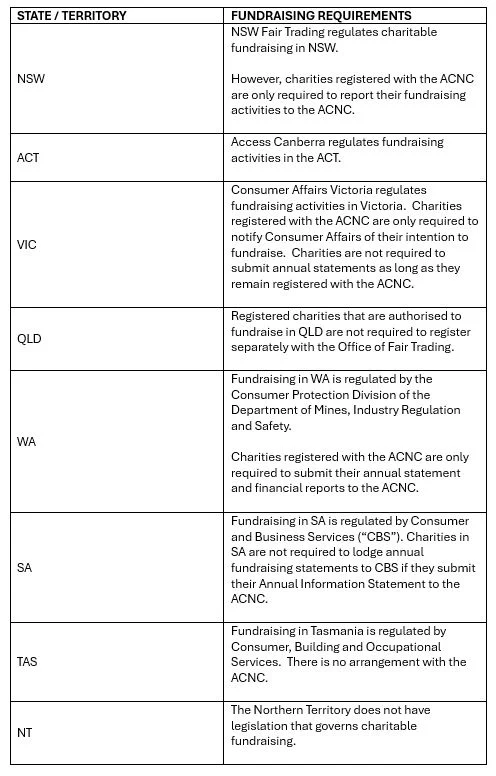Fundraising drives to coincide with donors’ tax receipt deadlines
There are still multiple individual state regimes for fundraising. Entities must hold fund raising licenses unless they are exempt.
Many charities associated with established religious organisations are exempt from the licensing obligations.
In Australia, fundraising is primarily regulated at the state and territory level. However, the ACNC collaborates with the various state and territory regulators to streamline reporting requirements.
Set out in the table below is a summary of the fundraising regulations across Australia.

Charities must avoid over marketing, and pressuring vulnerable persons to give beyond their means: ACNC and Fair trading have published various advices on this issue.
In 2023, the Federal Government announced 16 principles that apply to charities who undertake fundraising:
- The charity must explain the purpose of their charity and how the funds raised will be applied.
- Individuals fundraising on behalf of a charity must always be identifiable by the public.
- The charity must keep written records of all fundraising activities.
- Charities must acknowledge and comply with:
- refusal to make a donation;
- request not to receive future marketing;
- request to be contacted at a different time or by different means; and
- request to limit the number, type, or frequency of solicitations.
- Charities must never conduct door-to-door or telephone fundraising before 9am or after 5pm on a weekend, before 9am or after 8pm on a weekday, or on a public holiday.
- Charities must never mislead, deceive or use false information when fundraising.
- Charities must not place undue or unreasonable pressure on an individual when fundraising.
- Charities must never exploit the trust or lack of capacity of vulnerable donors.
- Charities must explain to donors the nature of the donation – i.e., a one-off donation or ongoing donation.
- Commercial fundraisers cannot accept donations without disclosing to donors that they will make a profit.
- Charities must exercise due diligence when engaging third parties.
- Charities must retain written records of all funds raised and how the funds were applied.
- Charities must protect the health, safety, and wellbeing of fundraisers directly employed or engaged by them.
- Charities must establish a complaints process to enable thorough investigation of fundraising complaints.
- Charities must ensure that the data collected for fundraising is managed in accordance with the Australian Privacy Principles.
- Charities must ensure that payments to commercial fundraisers are not excessive relative to the funds raised for charitable purposes.
And donors need to be reminded not all not-for-profits are charities and not all charities can write a deductible gift recipient receipt: but those which can must accurately separately record those gifts, so that if the ATO audits a donor a proper trace can be made back to the charity with the DGR status.